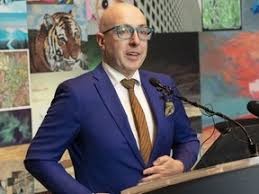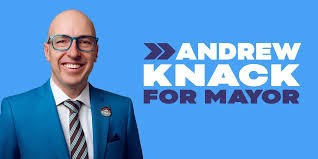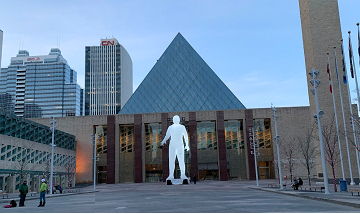Eric Bowling of the Edmonton Sun was able to get enough time for an interview with Edmonton's new mayor Andrew Knack. The interview is a brief look at what the mayor says his priorities are for the first 100 days. Read the interview so you can look back in February to see if the mayor was able to focus on his priorities.
It official, Andrew Knack has been declared as Edmonton's new mayor but who will serve with him on counsel is not yet confirmed, but some preliminary counts suggest some incumbents may be serving with Andrew Knack.
Low key, low energy mayoral race starts to take shape in Edmonton
Dave Cournoyer
There are 87 days until municipal election day in Alberta and Edmonton's sleepy mayoral race is beginning to take shape.
With Mayor Amarjeet Sohi not running for re-election after serving one term in the office, what looks like a fairly open field of current and former city councillors has emerged in the race to replace him.
With the city facing an addictions and mental health crisis, a pitch battle over zoning and infill in mature neighbourhoods, huge population growth that is putting immense pressure on the city’s public services, infrastructure, schools and hospitals, and a provincial government is openly hostile to the current city council, whoever is in the mayor’s chair for the next four years will face a rough and challenging time.
Look who’s running
- Former city councillor Michael Walters is the most recent candidate to enter the race after launching his campaign earlier this week. Walters served two terms on council from 2013 to 2021 and returns to politics after three and half years as a Senior Director of Strategy for Berlin Communications.
- Walters’ political experience predates his time on city council, having worked as an organizer for the Community Action Project and the Greater Edmonton Alliance, and running for the NDP nomination in Edmonton-Norwood in 2001 and carrying the Alberta Party banner in Edmonton-Rutherford in the 2012 provincial election. He backed candidate Michael Oshry in the 2021 mayoral election.
- Two-term south Edmonton city councillor Tim Cartmell is the only mayoral candidate to embrace the financial and organizational advantages of the new municipal political party system. Cartmell has been positioning himself for a mayoral run for most of the past four years.
- Cartmell had a head start in this race but his decision to go on vacation instead of showing up to vote to change the city’s divisive zoning bylaw has some political watchers questioning whether he is mayor material.
- Cartmell’s Better Edmonton Party has appointed candidates in all 12 city council wards. North Edmonton councillor Karen Principe, who recently ran for the federal Conservative nomination in Edmonton Griesbach, is the only incumbent councillor to join Cartmell’s slate.
- Three-term west Edmonton councillor Andrew Knack was the second major candidate in this race. Knack is well-known in political circles for his extensive community outreach work in his ward.
- “So far progressives and centrists seem to have coalesced around Mr. Knack,” wrote AlbertaPolitics.ca columnist David Climenhaga in his description of the race. Before Knack joined the mayoral race he was rumoured to be hoping to win an NDP nomination for the next provincial election.
- Former federal politician Rahim Jaffer was a surprise entry into the race. Jaffer was the MP for Edmonton Strathcona and a rising star in the Reform, Canadian Alliance and Conservative parties from 1997 until 2008 when he lost re-election and saw his political career take an unceremonious nosedive. Sixteen years later, he now runs a restaurant on Whyte Avenue and is running on a platform of reconnecting with Edmontonians and “reviving” the city.
- Jaffer is hosting a series of virtual and in-person town hall meetings to connect with voters.
- Former councillor Tony Caterina is also in the race. Caterina served four terms on city council representing northeast Edmonton before boundary redistribution in 2021 squeezed him out of his former ward and he was defeated in a downtown Edmonton ward.
- Caterina appears to be stepping into the shoes of former councillor Mike Nickel, who was the curmudgeonly right-winger in the last mayoral election.
- Paediatric dental surgeon Omar Mohammad is running a thoughtful and unconventional campaign by delivering his message to Edmontonians through music videos and podcast interviews.
- Abdul Malik Chukwudi is running in his second mayoral race. He earned 0.58 percent of the vote in the 2021 election.
Thanks for reading Daveberta. If you find today’s newsletter interesting, feel free to share it with a friend or colleague.
Who’s on first?
With no public polling released and most Edmontonians likely not paying much attention to the election right now, it’s hard to say who is actually leading the pack. At this point we’ve entered the invisible primary phase of the campaign, with donors, organizers and opinion-makers probably being the groups most interested in the race.
With the exception of Caterina, who has staked out a position as the most right-wing candidate of the race, it’s hard to point out many big policy differences between the pack of moderate centrist (and middle-aged male) candidates running on platforms that mostly focus on affordability, public safety and better city management. At this point the big differences appear to be mostly about style and vibes.
Political parties at city hall
This will be the first municipal election in decades with official political parties on the municipal ballot. Unlike provincial or federal political parties, which are organized around party members and local organizations, the municipal political parties introduced by the UCP government exist mostly as fundraising and organizing entities that allow slates of candidates to pool money and resources.
With no real demand from voters for political parties at the city level, the UCP government was forced to create a structure that gave financial incentive for candidates to form these slates.
The response to the new political party rules can be described as lukewarm at best. Cartmell is the only mayoral candidate to embrace the financial advantages of a slate. Cartmell’s Better Edmonton Party has appointed candidates in all 12 city council wards, including north Edmonton councillor Karen Principe. How united the slate is and whether Cartmell as party leader can actually enforce discipline in its ranks is questionable.
The only other municipal political party, the right-wing Principled Accountable Coalition for Edmonton (PACE), has named a slate of council candidates but has not named a mayoral candidate. The PACE Party is spearheaded by Doug Main, a retired television news anchor who served as the Progressive Conservative MLA for Edmonton-Parkallen from 1989 to 1993. Main’s PACE Party merged with the TapYeg Party created by gondola enthusiast and past federal NDP candidate Jeffrey Hansen-Carlson.
The two slates are running candidates in the election but there appears to be some serious questions if the Municipal Government Act prohibits city councillors from forming formal caucuses like the ones that exist in the provincial legislature and federal parliament.
With Principe running under Cartmell’s party banner, all other incumbent councillors who are running for re-election — Michael Janz, Ashley Salvador, Anne Stevenson, Erin Rutherford, Aaron Paquette, Keren Tang, Jo-Anne Wright, and Jennifer Rice — will be listed as Independent candidates on the ballot.
Councillor Andrew Knack says residents and businesses in Ward Nakota Isga have suffered from Valley Line LRT construction fatigue long enough and want the work completed this year. Knack put forward a motion to that end in October and the City and construction company Marigold Infrastructure Partners have developed a plan to accelerate the roadwork. The proposed plan would see work done in phases with certain sections being closed entirely, for weeks or months, at a time. This would mean short term pain but a goal to complete construction in the area by the end of this November.
Kris Burwash, owner of Listen Records says his business has been inconvenienced for years so he’s on board with the proposed plan — for now.
The Global News article below lists proposed timelines for the various phases.
The recent snowfall has rekindled the problem of what to do about parked cars that impede snow removal on residential streets. A number of councillors shared their frustrations with the lack of effect parking bans have and considered what more can be done to alleviate the problem, including fines and towing.
Councillors Keren Tang, Andrew Knack and Erin Rutherford articulated the problems parked vehicles pose and David Jones, branch manager for bylaw enforcement shared that the lack of bylaw officers hinders enforcement of parking bans.
Last spring Alberta's UCP government announced that parties will be able to run candidates in municipal elections beginning in Calgary and Edmonton. Even though 70 percent of respondents to the government's public survey disagreed with introducing the party system, the government passed legislation leaving people and political pundits questioning and confused. Some pundit comments are below and the public can share their comments and thoughts on focaLOCAL.com
MacEwan University associate professor Brendan Boyd says the party system is where independent thought goes to die which leads to what people call the democratic deficit. Ric McIver, Minister of Municipal Affairs says political parties make candidates' positions on issues more transparent. City councillor Andrew Knack believes freedom of expression and choice will be lost with the change. Councillor and mayoral candidate Tim Cartmell plans to form his own party, which he said will not be partisan. Doug Main who is spokesperson for The Principled Accountable Coalition of Edmonton (PACE) says they are not describing themselves as a right, centre or left-leaning ideology.
Existing provincial and federal parties cannot register in Alberta's civic election under the province's rules which means it is incumbent upon any parties to enlighten and inform citizens just who they are and what they stand for.
When the provincial government passed Bill 20 which includes the introduction of local political parties, it heralded a new look for local elections. Two groups were quick out of the gate and have already stated their intent to run a slate of candidates in the next election.
Principled Accountable Coalition for Edmonton (PACE) has been hosting information sessions to inform citizens of their plans if they’re elected into office. Doug Main, the PACE vice-president of communications, says PACE is looking for candidates who are fiscally proven, business-friendly, growth-oriented, community focused and fact-based.
Jeffrey Hansen-Carlson, president of the other party, Transparent and Active Partnerships Edmonton (TAPYeg) believes parties are an important part of democracy in all levels of government.
As expected there was immediate opposition to political parties at the local level. Nakota Isga councillor Andrew Knack questions how candidates will be able to represent their constituents to the best of their ability while holding allegiance to a prospective party’s goals. McEwan University political scientist Chaldeans Mensah says this will bolster the left-wing to right-wing political spectrum.
It will be interesting to watch if other groups form and if so, under what banner?
If you're unfamiliar with BILL 20 there's a PDF of it below.
The Alberta government passed a new law for local elections and as a result the 2025 Edmonton election will end up costing almost $5 million more than previously budgeted. Although there is no evidence of voter fraud in Alberta associated with vote-counting machines, the Alberta government's new law stipulates that all ballots most be hand counted and a permanent electors list must be established. The city will need to hire more temporary election workers for advance and regular voting days, plus more temporary or short-term employees for other work related to the election. In addition to more manpower Edmonton will have to print 1.6 million extra ballots and 240,000 more voter information cards.
Ward Nakota Isga Coun. Andrew Knack is frustrated because although the city didn't ask for the new rules, they will cost the city the equivalent of a 0.3 per cent tax increase. City council will discuss the report from Elections Edmonton at the city council meeting Wednesday or Thursday.
On Monday Andrew Knack became the first city councillor to publicly indicate his intentions for the next October's municipal election. Andrew Knack announced that he will not be seeking re-election as an Edmonton city councillor in ward Nakota Isga. After more than 10 years as councillor Knack says its time for a change. Knack believes that new council representation will be good for residents of ward Nakota Isga and although he hasn't decided what's next for himself continuing his political career at the provincial or federal level is a possibility.










